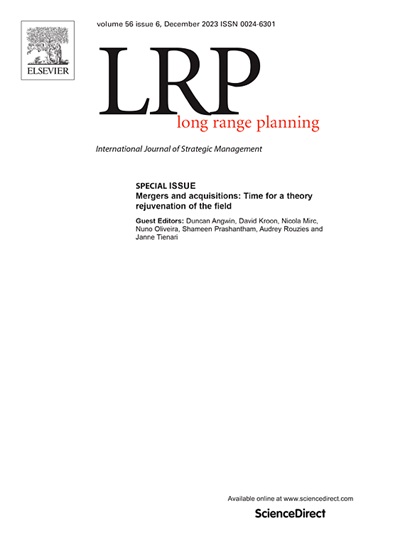Labour-cost retrenchment strategies in times of crisis: Comparing market reactions to flexible and rigid strategies
IF 6.3
2区 管理学
Q1 BUSINESS
引用次数: 0
Abstract
Guided by an institutionally embedded resource-based view, this paper addresses two under-researched questions. First, what effects do flexible strategies for labor-cost retrenchment (e.g., wage-based and functional flexibility) have on firms' market value as compared with rigid strategies (such as pure downsizing)? Second, what effects do flexible strategies have, compared to rigid strategies, when firms have a high level of knowledge assets? We answer these questions by focusing on firms in the research context of a stakeholder-capitalism environment. The dearth of studies on flexible strategies is surprising when one considers that firms in many advanced economies deploy them widely to reduce labor costs during times of crisis. We address this research gap with a novel data set of 220 retrenchment announcements by Japanese firms. We find that announcing the adoption of flexible strategies is significantly and positively associated with a greater likelihood of the firm’s market value increasing. Further, flexible strategies are evaluated more positively if they protect knowledge assets. We attribute these effects to flexible strategies being perceived not only as a capability but also as a legitimacy signal – that is, as an effort to maintain capabilities in an environment characterized by long-term in-house employment and to align with the norms of the broader institutional landscape.
危机时期的劳动力成本缩减策略:比较市场对灵活和僵化策略的反应
在制度嵌入的资源基础观点的指导下,本文解决了两个研究不足的问题。首先,与刚性战略(如纯粹的裁员)相比,灵活的劳动力成本削减战略(如基于工资和职能的灵活性)对公司的市场价值有什么影响?第二,当企业拥有高水平的知识资产时,与刚性战略相比,灵活战略有什么影响?我们通过在利益相关者-资本主义环境的研究背景下关注公司来回答这些问题。考虑到许多发达经济体的公司在危机时期广泛采用灵活战略来降低劳动力成本,对灵活战略的研究的缺乏令人惊讶。我们用220家日本公司裁员公告的新数据集来解决这一研究缺口。我们发现,宣布采用灵活的策略与公司的市场价值增加的可能性显著正相关。此外,如果灵活策略保护了知识资产,则对其评价更高。我们将这些影响归因于灵活的战略不仅被视为一种能力,而且被视为一种合法性信号——也就是说,作为一种努力,在以长期内部雇佣为特征的环境中保持能力,并与更广泛的制度格局的规范保持一致。
本文章由计算机程序翻译,如有差异,请以英文原文为准。
求助全文
约1分钟内获得全文
求助全文
来源期刊

Long Range Planning
Multiple-
CiteScore
13.00
自引率
7.10%
发文量
75
期刊介绍:
Long Range Planning (LRP) is an internationally renowned journal specializing in the field of strategic management. Since its establishment in 1968, the journal has consistently published original research, garnering a strong reputation among academics. LRP actively encourages the submission of articles that involve empirical research and theoretical perspectives, including studies that provide critical assessments and analysis of the current state of knowledge in crucial strategic areas. The primary user base of LRP primarily comprises individuals from academic backgrounds, with the journal playing a dual role within this community. Firstly, it serves as a platform for the dissemination of research findings among academic researchers. Secondly, it serves as a channel for the transmission of ideas that can be effectively utilized in educational settings. The articles published in LRP cater to a diverse audience, including practicing managers and students in professional programs. While some articles may focus on practical applications, others may primarily target academic researchers. LRP adopts an inclusive approach to empirical research, accepting studies that draw on various methodologies such as primary survey data, archival data, case studies, and recognized approaches to data collection.
 求助内容:
求助内容: 应助结果提醒方式:
应助结果提醒方式:


